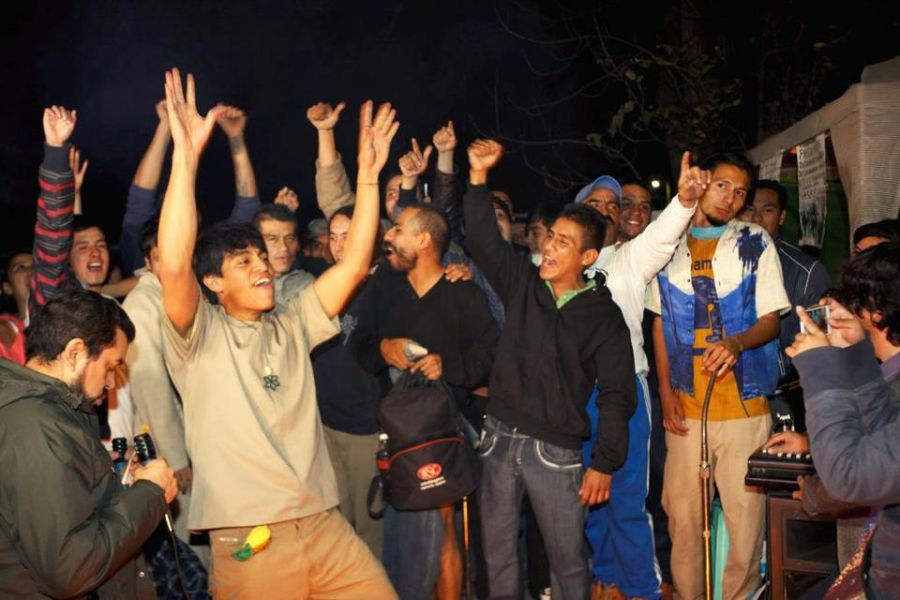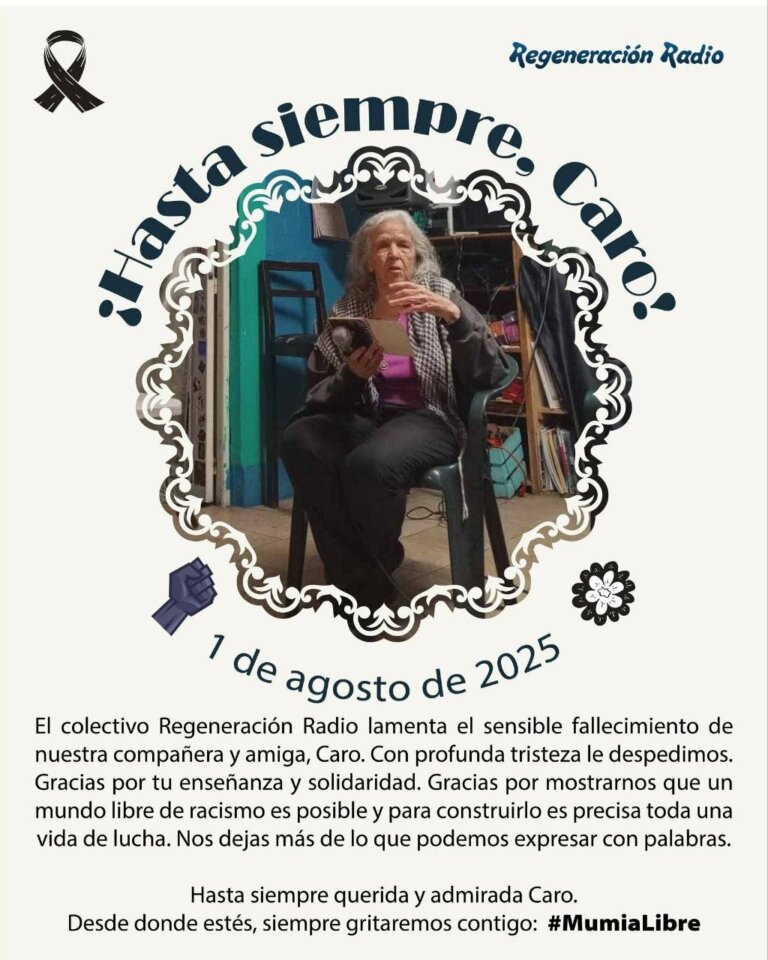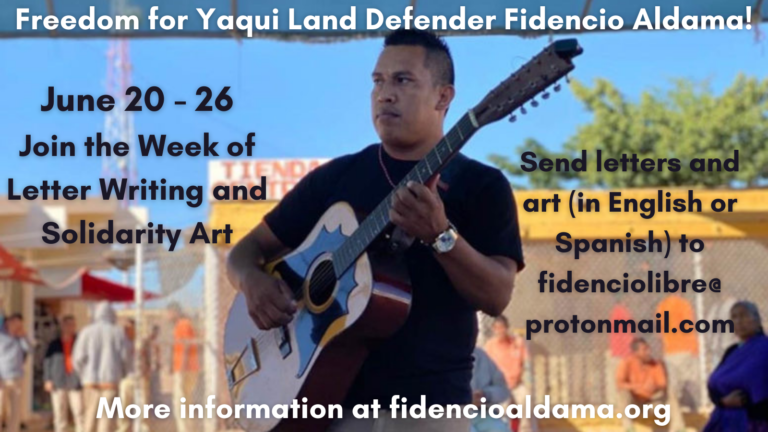x carolina
Around 7:30 pm on the night of December 27, the musician Bryan Reyes walked out of the prison in the northern part of Mexico City known as the Reclusorio Norte, or simply Reno, where he was greeted with hugs, slogans, smiles and tears by family members and comrades who had been waiting since noon for the 14 remaining prisoners to get out on bail. Two hours later, the other male prisoners made their exit, one by one, to the sound of loud cheering by the tumultuous crowd. Next came professor Enrique, to shouts of “The teacher in struggle also teaches”! Then Jorge, Carlos, Sandino, Eduardo, Daniel, Styliano, Obed, César, Roberto, Oswaldo and Alejandro. Each comrade received strong applause and cheers: “We’re with you, Obed!” And the name of the political prisoner changed as each one appeared. As the uniforms were burned and clean street clothes put on, you could hear the words of the song, “Dame dame dame dame todo el power…” But Rita, the only woman prisoner, was missing. It was announced that she was taken from the Santa Martha women’s prison to Reno and then back again, where she was released at 10:30 pm in the camp where people had been waiting for her all day. She thanked everyone for their support, but added, “Even though we’re out, we still haven’t won. The struggle continues.”
At 2:00 that morning, a change in Article 362 of the Mexico City Penal Code became official, with sentences for “attacks against the public peace” reduced from 5-30 years to 2-7 years, and a reclassification of the offense. A few hours later, bail was set at $40,000 pesos for all the prisoners except Bryan, who has an additional property damage charge.
Outside the Reno prison, Juan de Dios Hernández of the December 1st Lawyers League read a message recognizing the partial freedom of the prisoners, who are out on bail but still face charges. The true provocateurs, said Hernández, are to be found in the federal and Mexico City governments, and include Felipe Calderón, Marcelo Ebrard, Miguel Ángel Mancera, Enrique Peña Nieto, Manuel Mondragón, Miguel Ángel Osorio Chong and Jesús Rodríguez Almeida, among others. He stated that the lawyers will not rest until Article 362 is repealed, the prisoners are absolved of all charges, and the material and intellectual authors of the repression, punished.
Three days before getting out on bail, five of the prisoners had started a hunger strike, and eight others, a 72 hour fast. Bryan Reyes wrote the following lines when he announced his participation in the hunger strike: “…Rather than simply send you greetings, I want to send a cry of resistance that will never be silenced, because neither imprisonment or death will stop our struggle. I thank you all for your support, but above and beyond that, I want to say how proud I am to be part of a combative people that has awakened and understands that freedom may not be in the streets, but that is where it is sought. Today, repression has 14 names; it may bear my own or that of Rita, Eduardo, or Daniel, but even those who are out are still prisoners to the neoliberal capitalist policies that revealed a vast number of faces last December 1st. That’s why we will begin a hunger strike on Monday, December 24, at 12 noon in order to weave the broadest sense of freedom into this struggle with the aim of repealing Article 362 and achieving our release, which will write one more letter of that longed-for word, ‘Freedom’…”
At 11:15 pm, the comrades thanked their families, friends, and the people who were always there in the camp. They hadn’t eaten since Monday and were anxious to eat supper together, but not before shouting, “If there’s no revocation, there’ll be revolution!”
The good thing is that now the former political prisoners will be in the streets instead of in a cell to continue fighting for their freedom. The bad thing is that they still face charges and that Article 362 hasn’t been totally repealed as the so-called “leftist” legislators had promised. Given that there is no evidence to justify the charges against them, the comrades should already have their unconditional freedom, yet they still face charges. The lawyers have until January 3 to present all the evidence in their favor, and the comrades will have to go the court to sign a paper every week and will not be able to travel outside the country until the trials are over.
Despite the efforts of the new Mexico City Mayor, Miguel Mancera and the PRD to clean up their image, now feigning an interest in human rights, people haven’t forgotten that it was the PRD governments who have carried out the ethnic and social cleansing of the city for the benefit of Carlos Slim and the corporate class, applied “zero tolerance” policies, pushed for and adopted Art. 362 in 2002, ordered the repression on December 1 in complicity with Enrique Peña Nieto, refused to drop the charges against the comrades, and refused to repeal Article 362.
It is clear that the comrades are now in the street, not because of the goodwill of the Mexico City government, but instead due to their own strength of character, their fasts and hunger strikes, the three support camps, three weeks packed with marches and rallies, and the efforts of the Coordinating Group, the Lawyers’ League, and many collectives, organizations and individuals who have participated in one way or another to win their freedom. The demands are still the same: total and immediate freedom, the repeal of Article 362, punishment for those responsible for the repression, reparation of physical and psychological damage, and the proscription of projectiles such as rubber bullets.
In the eyes of the people, a stain covers the names of Enrique Peña Nieto and ex Mexico City Mayor Marcelo Ebrard, who ordered the joint fascist police operation on December 1. Ebrard, who wants to be President of Mexico in 2018, was so anxious to present his “iron fist” credentials to the owners of capital and to the government of the United States, that he gave the order to arrest anyone in sight during the protests. Other agents of repression include the police who acted with extreme cruelty against the demonstrators, beating and torturing them and shooting prohibited projectiles that put out the eye of Uriel Sandoval and left Kuy Kendall seriously injured in the hospital; Miguel Mancera, who not only refuses to drop the charges against the social activists who have exercised their legitimate right to protest, but has also promised to arrest even more people; and all the political parties who refused to repeal Article 362, which criminalizes social protest. Although the legislators lowered the sentences for the crime of “attacks against the public peace”, the law is still the equivalent of the federal “anti-terrorist” law and is now strengthened with a new clause that says that a harsher sentence will be applied in case of recidivism, which will make it impossible to be released on bail.
A strong point of the movement for the freedom of the political prisoners has been the establishment of camps in the Zócalo and outside the Reno and Santa Martha prisons, which have served as centers for giving out information and collecting supplies, as well as points of contact with the prisoners, their families, and lawyers. They’ve also served as spaces for getting better organized, debating, and calling for new mobilizations. At the Zócalo camp, nine comrades held a fast lasting from 48 to 72 hours, and the presence of the large tent attracts the attention of people not so thrilled with the absurd spectacle of the ice-skating rink. The camp outside Reno has been cleared out three times and subject to police harassment, but has been able to win the support of several social organizations as well as neighbors who live near the prison. Comrades at the camp have also gathered information about the prisoners and produced posters containing the information. At the Santa Martha camp, people have gone out in brigades to talk to people in the neighborhood, markets, and public plazas about the situation of the prisoners, and have won support from both neighbors and social organizations. At all the camps, posadas were held before Christmas, and all are committed to staying where they are until the last prisoner is free.
FOTOS: Regeneración Radio, Jaime Quitana/Desinformémonos, anonymous








